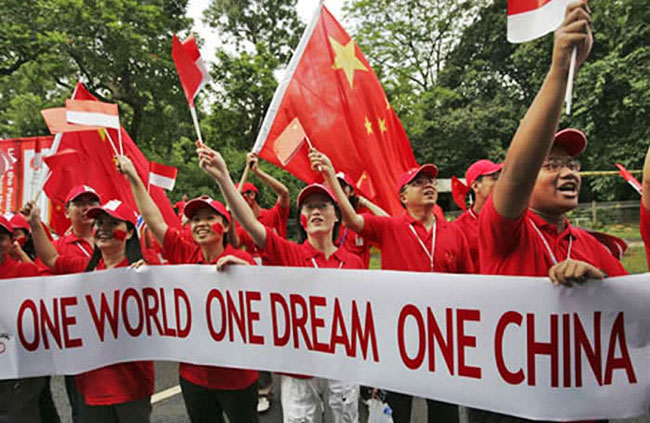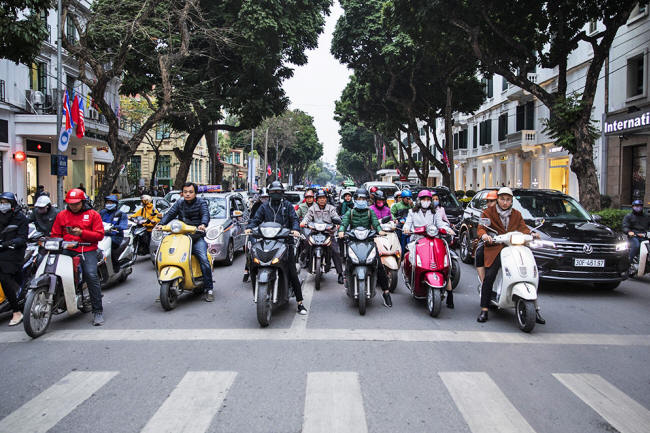|

by David Howell
Mar 20, 2019
from
JapanTimes Website
|
Based in London, longtime Japan Times contributor David
Howell is a Conservative politician, journalist and
economic consultant. He is chairman of the House of
Lords International Relations. |

Image: Xinhua/Agencies
Asia is morphing into Technocracy, with China
leading the way.
Communism and Socialism are fading away, even as
the trappings remain.
Facing a potential enemy demands that we know
who he is and what he believes.
Source
Technocracy
replaces philosophy
LONDON
Among the unending flood
of global news in recent weeks, there was one item that received
almost no media comment but which could in the longer run be the
most significant of all.
This was the reported remark by U.S. President
Donald Trump, while in Hanoi,
that if
Kim Jong Un would play ball in
halting his nuclear program, then America would assist in turning
his North Korean "hermit" nation into another Vietnam.
Vietnam? Surely not. There must be some mistake...
-
Was not Vietnam
the place where 55,000 American soldiers died almost half a
century ago in a vain effort to stop the Vietnam
domino falling into the grip of the spreading communist
dictatorship?
-
Was it not in the
very front line in the world struggle between freedom and
tyranny, individual liberty and state despotism?
But, no, there was no
mistake.
Trump, with his famous
transactional mindset, was looking past and through the slogans
of yesterday and discerning utterly changed conditions on the
ground.
There is plenty to
criticize Trump for as he keeps playing the openly populist tune
back in Washington.
But it could be that in
this instance he and his advisors are seeing the real world more
clearly than the armies of analysts, party politicians, academics
and ideologues who love to fight the battles of long ago.
For, of course, what lies behind the Trump view of things, and maybe
the view prevailing through at least the two-thirds of humanity who
populate modern, fast-rising Asia, is that the left-right
ideological struggle is over and that in the digital age it is
technocracy and technology that now reign supreme.
The Vietnamese government calls Vietnam a "Socialist Republic."
In practice it now has
strong capitalist characteristics.
-
Is it therefore a
free economy or a socialist planned economy? The answer is
neither.
-
Is it moving
toward the Western model of democracy and market economics?
If this means weak and volatile government, widening
inequalities, slow growth, lagging infrastructure, rising
crime and frequent street protests, the answer is "no" to
that, too.

In Vietnam, like much of Asia,
technocracy and technology reign supreme
and ideology takes a back seat.
BLOOMBERG
The truth is that the
political vocabulary of Western societies and institutions,
the political dialectic evolving over the last 200 years or more,
cannot explain the patterns of governance now emerging around the
world.
The words are just not
there...
A digitally empowered and
connected populace is now in a position to demand, insistently and
continuously, outcomes that may well contradict each other but just
do not fit into the old spectrum of right and left
that still shapes much of the Western political colloquy.
Instead, the desired new goal can best be labeled "quality
government."
That translates into
calls for,
the highest quality
education, much better health care, homes, real gender equality,
security, law and order on the streets, jobs for the young, care
for the old, a fresh and clean environment, water and reliable
energy, a good supply of dignity and identity recognition, and
riddance of corruption, which is always the telling and fatal
mark of bad governance.
Where systems and regimes
can deliver on these fronts, political stability is going to
prevail.
Where the system is
too slow to realize that the people are now in power,
protest and the populist virus will inevitably take over.
-
In the West,
certainly in Europe and America, this is
already happening. Long stable democracies are grappling
with completely unfamiliar new forces and threats. Old
political parties, formed around the axis of past debates,
are breaking up.
-
Modern Asia
has its quarrels and challenges, but it also has the chance
to leapfrog the Western experience and carve out new
political paths. The new emerging pattern might be labeled
techno-democracy. It requires neither a coercive state too
strong and oppressive, nor a state too weak to regulate and
administer the rule of law evenly and firmly.
The great causes of
freedom and liberty, for which the West has expended so
much blood and treasure, are not dead but require restating in the
language and concepts of successive generations.
So asserts one of the
great defenders of individual freedom under the old order,
Friedrich Hayek, in his massive 'bible,' "The
Constitution of Liberty."
But Hayek lived before the ubiquity of the cellphone, the internet,
the World Wide Web and the age of connectivity and transparency they
bring.
These things rewrite the
whole score. They reallocate the sources of power somewhere new
between the state and the individual. They propel socialist and once
divided Vietnam into new types of capitalism. They could yet do the
same for a united Korea.
They are even now in
China itself allowing technocratic governance to shred the old
doctrines and "isms" of one-party rule.
Trump is an unlikely herald of this new pragmatic order. And anyway,
in his own words, he wants to keep America out of more foreign
ventures.
But at least when he
travels abroad he shakes off some of the theories and dogmas that
are paralyzing Western institutions and political progress.
And for that there should
perhaps be a small moment of thanks.
|



